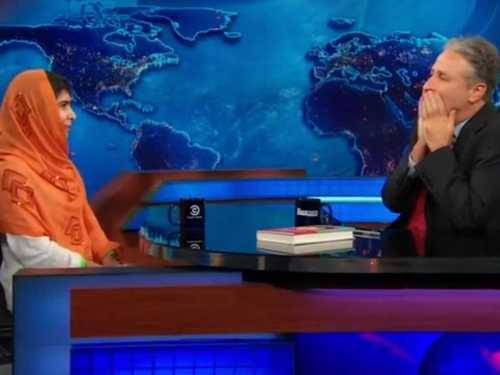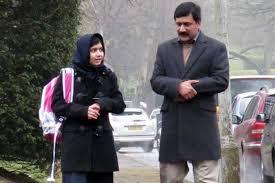-
I finally finished reading this yesterday and thought it was a pretty genuine and sincere account from someone who truly believes in the cause of education. It was refreshing to hear the passion about the idea of education and it reminded me a lot of my friends and myself back in the day, so deeply engrossed in the culture of the Indian/Asian education system. That drive and competition for being “#1” in the class etc., is relatively non existent here in the west as compared to CBSE. But of course the book was about a much larger fight for education and it certainly was fascinating to learn a little bit more of the backstory to Malala Yousafzai.
(Malala on the Daily Show)
From the beginning it was intriguing that this eloquent and determined Malala didn’t appear out of nowhere, her father has so much to do with regards to enabling her. When you look at the people who surround her in Swat valley including her mother, her father is a real anomaly and relates back to the concept from Lean In where for true women equality, the men are so important as enablers. Sometimes I even got the sense that her mother was discouraging. Malala had been giving speeches and done international stories much before she was shot in the head so basically she was just one big “break” away from reaching the international ears. Her dad had almost been grooming her for this.
The practice of the hijab/burka was brought up several times which I have always found especially interesting. Malala seems pretty against the entire covering of the woman’s body and even confesses that when she saw women walking around without hijab she tried it but then is quick to take it back saying freedom doesn’t mean not wearing the hijab. Personally, I am conflicted on the practice: I am definitely a staunch opponent of the burka but at the same time forcing women to entirely unfollow the practice of hijab doesn’t seem right as well (Like in France etc.). Letting women decide for themselves seems best but then of course we cannot control their lack of awareness or pressure for “religious reasons”.
It was especially upsetting to read about the demolition of Buddhist statues and stupas in Swat valley. I was completely unaware that Buddhism had even spread to those regions. So yeah, thanks for nothing Taliban.
Always fun to see India pop up here and there in Malala’s accounts. She even talks about Lashkar-e-Taiba and how they had been “accused” of Mumbai attacks but had also helped the Swat people during times of floods. Though it definitely enraged me that she was even doubtful of Lashkar-e-Taiba involvement, from Malala’s perspective some of these organizations had been there for the people when the Pakistani government had done nothing. You definitely get a better understanding of the reasons for anti-American sentiment and she is refreshingly frank about the whole drone issue. Seriously, drones are just awful.
Malala is still deeply religious which is such a huge part of south asian culture, but what bothers me is the fear. This is something I definitely felt too as a Hindu growing up but Malala is always quick to say that her actions are validated by Islam. Of course she grew up in an environment where this was essential but this constant need for validation from religion for actions is something I felt a little uncomfortable with.
My favorite, or I should say most relatable part of the book was definitely the epilogue. Malala has started school in England and a lot of the experiences she is having with making friends etc. is so much like my first few months in Canada from Qatar. It’s hard moving especially when you were pretty much the “cool” kid and then you’re thrown into this very overwhelming western schooling system where your social skills really have to be on steroids. But then hopefully Malala doesn’t change and stays true to her values because if she truly doesn’t want to pursue what she says is going back to Swat, then I think she will be able to make the greatest impact the more in touch she is with life there.
As much as I’m glad she is going to this great school now, I really hope she is able to bring some of democracy’s best ideals back to Pakistan and still be relatable as she was.
Eye-opening and inspiring book that definitely stays true to Malala’s innocence yet relentless hunger for education.
Some of my favorite quotes:
“I was a girl in a land where rifles are fired in celebration of a son, while daugheters are hidden away behind a urtain, their role in life simply to prepare food and give birth to children.”
“Jinnah said, "No struggle can ever succeed without women participating side by side with men. There are two powers in the world; one is the sowrd and the orther is the pen. There is a third power sronger than both, that of women.”“
This is noteworthy because from Malala you really get the sense that Jinnah’s Pakistan, though made for Muslims, did not set out to be the conservative place that Pakistan has become.
"Is Islam such a weak religion that it cannot tolerate a book written against? Not my Islam!”
Always my thought when fatwas and threats are issued by terrorists and the Taliban! How weak is your religion that you need to be so violent to protect it?
And finally in the spirit of Thanksgiving…
“We human beings don’t realize how great God is. He has given us an extraordinary brain and a sensitive loving heart. he has blessed us with two lips to talk and express our feelings, two eyes which see a world of colors and beauty, two feet which walk on the road of life, two hands to work for us, a nose which smells the beauty of fragrance, and two ears to hear the words of love. As I found with my ear, no one knows how much power they have in each and every organ until they lose one.”
Good Luck, Malala.
azizahxhossain reblogged this from anjali-k
eliteparatha liked this
 anjali-k posted this
anjali-k posted this
Recent Post
Read more

